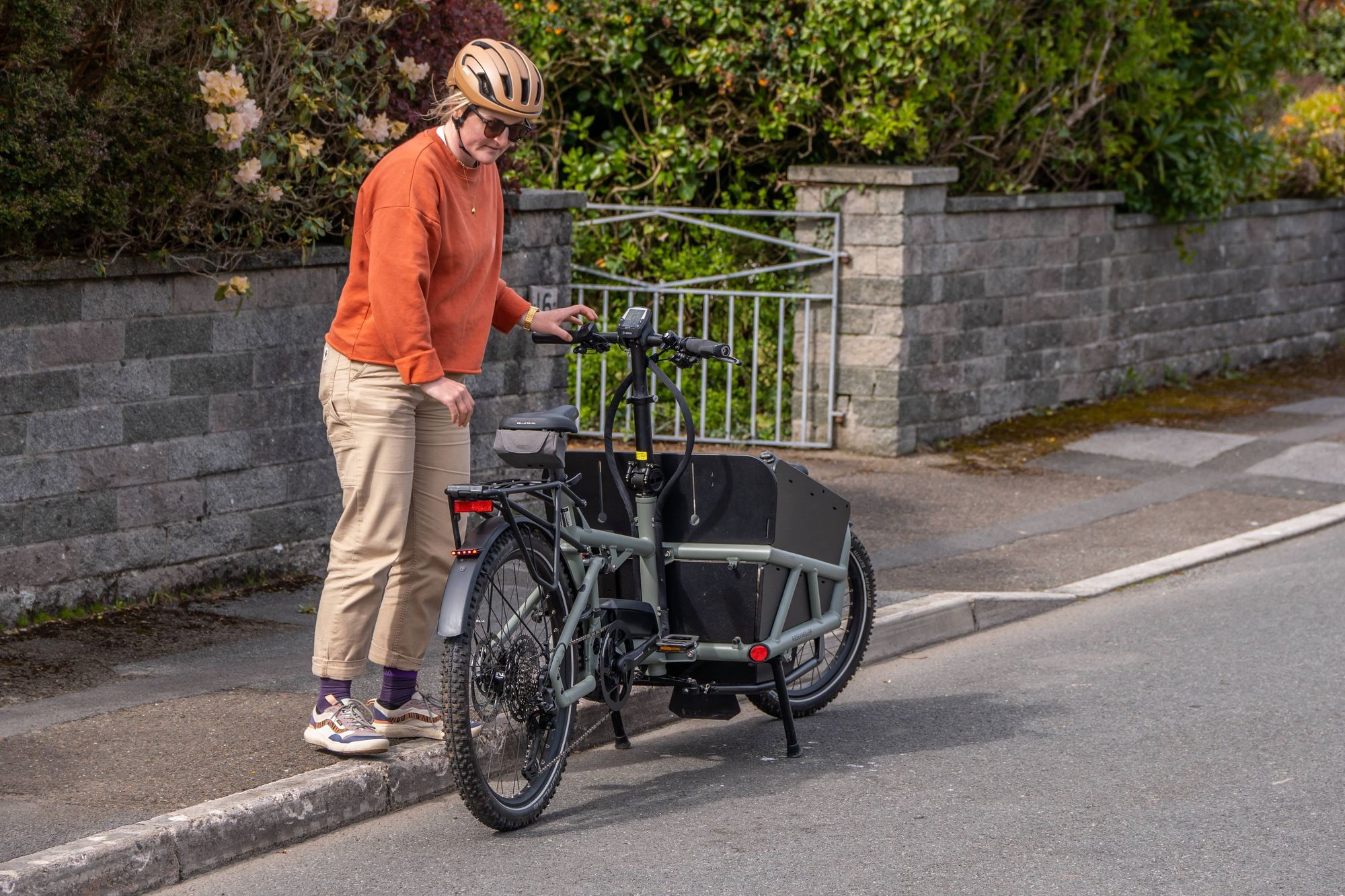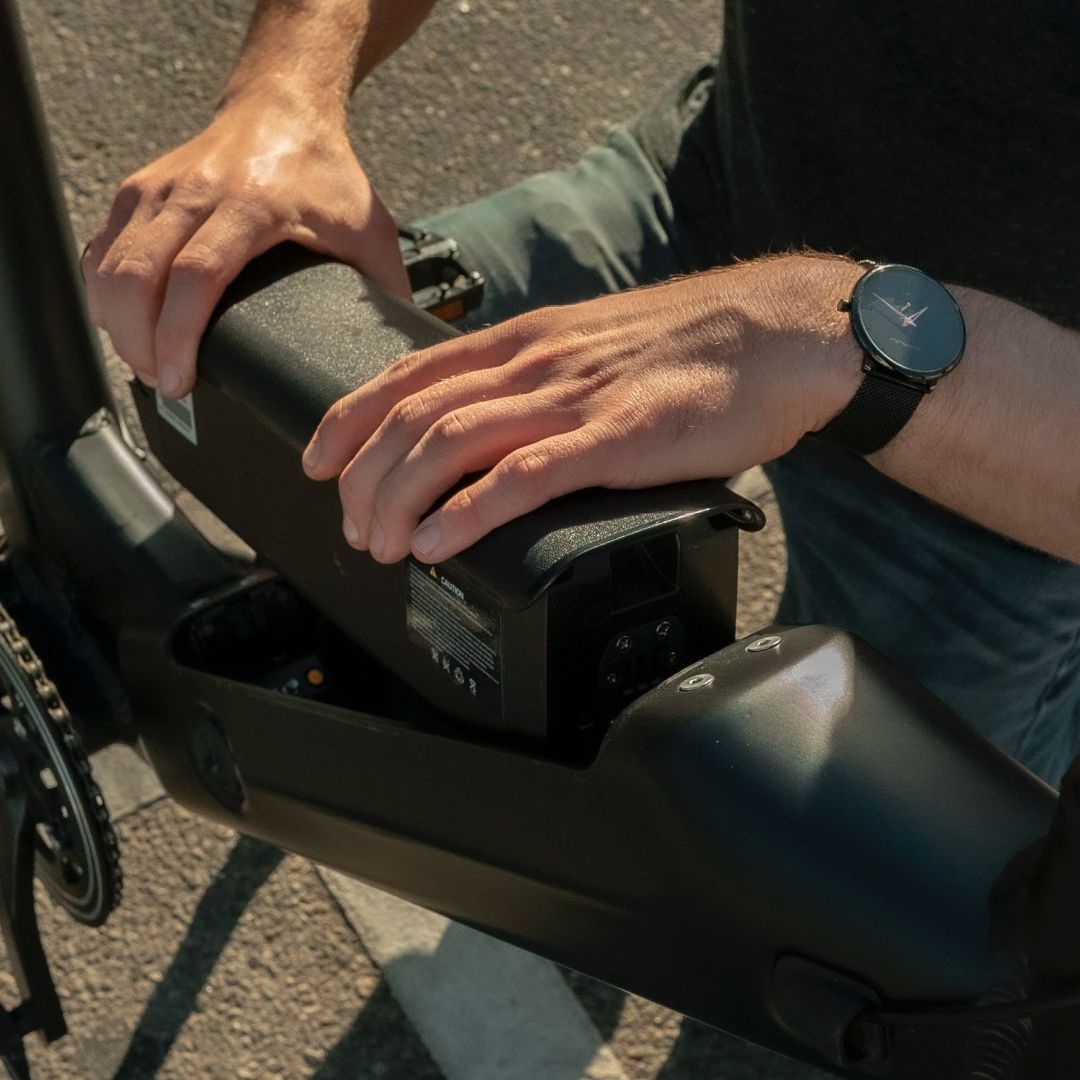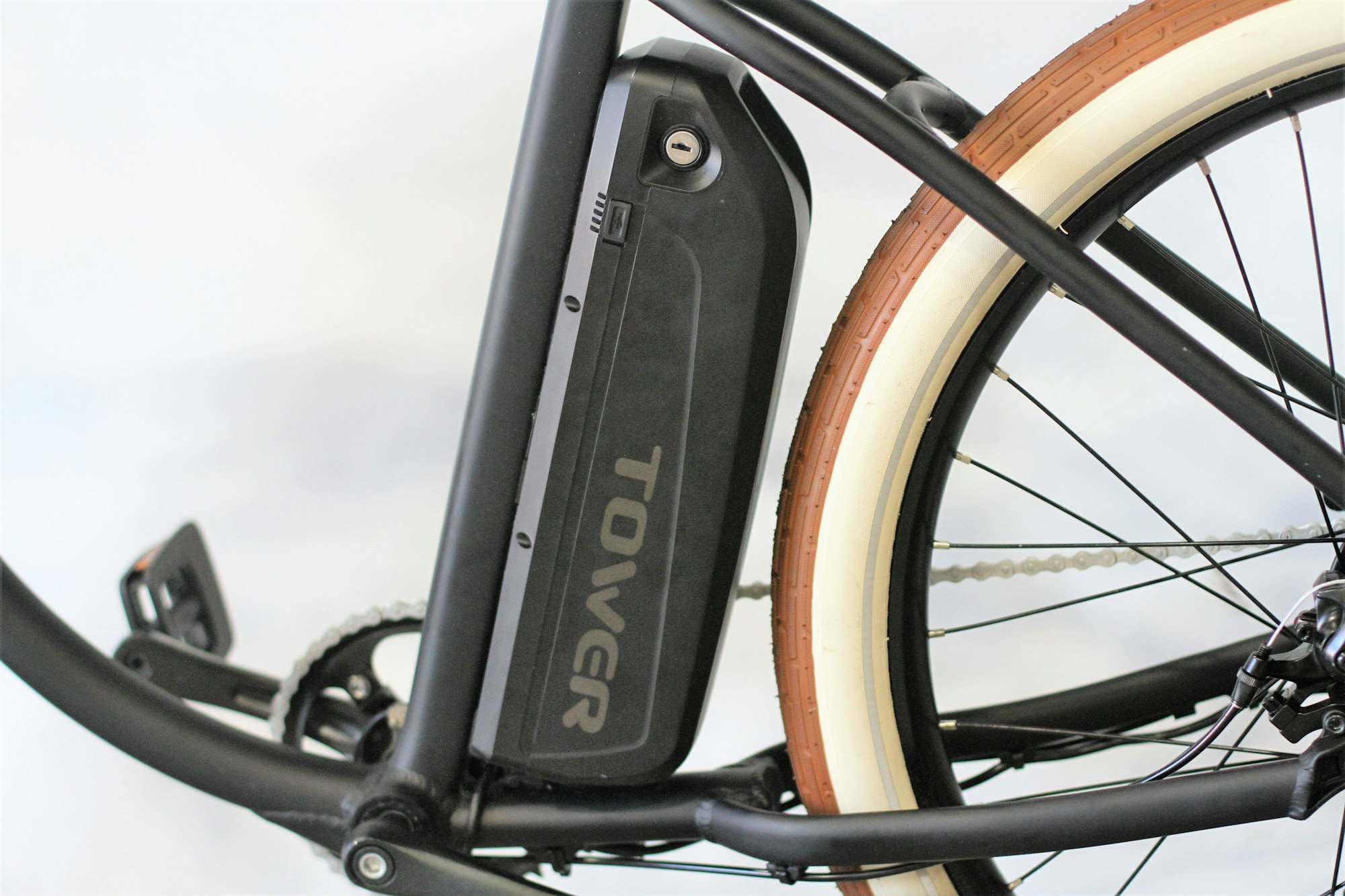In other words, posting your e-bike in a bike storage shed without much thought isn’t a brilliant idea. But how do you store an e-bike to ensure it stays in good condition? In this guide, we’re looking at how you should store your e-bike.
Should you clean your e-bike before storing it?
Before storing, you’ll want to ensure your e-bike maintenance is up-to-date. This is especially true if you’re storing it for a prolonged period. However, it’s also still necessary if the bike is used regularly.
Dirt, salt, mud, and water are often found on electric or standard bikes. Therefore, before storing it, you’ll want to remove all of these factors to avoid the bike suffering from corrosion or damage. With e-bikes, it’s imperative, as there are electronic components involved.
During the colder months, removing dirt and salt becomes even more crucial. The cold weather can exacerbate the corrosive effects of these substances, particularly on your bike's delicate electrical components and brake pads.
Expert tips on how to clean and dry your e-bike
Here's a list of tips for cleaning and drying your e-bike:
- Rinse Gently: To loosen dirt and mud, begin with a lukewarm water rinse.
- Focus on Sensitive Areas: Protect electrical components using a damp cloth instead of spraying directly.
- Use Bike-Specific Cleaners: Choose cleaners made for bikes to effectively remove grime without harming surfaces.
- Scrub Thoughtfully: Gently clean the frame and wheels with a soft brush or sponge, being mindful of the battery and motor.
- Dry Thoroughly: Use a soft cloth for drying and avoid exposure to direct sunlight or leaving the bike in damp areas.
- Check the Brake Pads: Inspect the brake pads for any residue to ensure they perform optimally.
- Lubricate Moving Parts: Apply lubricant to the chain and other moving components to prevent rust and maintain smoothness.
- Battery Care: Clean the battery with a dry cloth, checking for corrosion or other issues.
How to correctly store your e-bike battery
The battery component is the primary differentiator from a regular cycle, and it plays a significant role in how you store the bike. It would help if you learned how to safely store your e-bike battery - as it can save you many headaches in the future.
First, you need to understand the makeup of your e-bike battery, as there are different types on the market. Lithium-based batteries are the most commonly used, but it might be that your e-bike has a lead-acid battery.
Change the battery
Before storing your e-bike, you should always charge the battery. Failing to do so can lead to deterioration and even a dead battery. They are expensive to replace, so you must ensure that it’s fully charged before storing your e-bike.
Additionally, keeping an eye on battery levels is essential. Storing a battery at extreme charge levels (either fully depleted or fully charged) can stress the battery and shorten its lifespan.
Storing lithium-ion batteries at around 40-70% charge, considered the optimal range to maintain battery health over time, is often recommended.
Keep the battery separate
No matter which type of battery you have, it should be separated from the e-bike when it comes to storage. Batteries also shouldn’t be stored in hot temperatures as they can ruin performance and decrease the battery’s life.
They should also be kept away from fire hazards to mitigate the risk of catching fire or exploding. Ideally, you want to keep the battery in a cool and dry climate to ensure optimal performance and safe storage.
It’s also worth storing the battery in an area without significant temperature fluctuations. Somewhere that endures extreme temperature changes – such as an outdoor shed – isn’t ideal because elements like condensation could damage the battery.
E-bike battery storage tips
When dealing with extreme temperatures or planning to store the battery for extended periods, consider these additional tips:
- Store your battery in a consistent, moderate temperature. Ideal storage conditions are usually between 10°C and 20°C. If you live in an area with extreme temperatures, consider using a climate-controlled space or a specialised battery storage case.
- Even when not in use, check the battery's charge level every few months. If it drops below the recommended storage charge, give it a little boost to return to the safe range.
- Place the battery in a non-conductive and fire-resistant container. This isolation can provide additional protection against environmental factors and potential accidents.
- Ensure the battery's terminals do not come into contact with metal objects, as this can create a risk of short-circuiting. Cover the terminals with a non-conductive material if necessary.
- If storing in a garage or shed, avoid placing the battery directly on the floor, especially cold concrete. Instead, use a shelf or a wooden platform to reduce potential moisture exposure and temperature fluctuations.
Can I store my e-bike outside?
There’s no problem storing your e-bike outside, but you should keep the battery indoors. Lithium batteries, in particular, rely on storage temperatures of 4c to 21c. If the temperature increases or lowers, it could damage the battery's capacity.
Securing Your E-Bike Against Theft
If you plan on storing your e-bike outside, you should only do it for the short term. The longer you leave your bike out – especially in a public place – the higher the theft risk.
E-bikes, in particular, are sought after by criminals because of their higher price and popularity. To mitigate these risks, take the following precautions:
- Use high-quality locks: Invest in sturdy U-locks or chain locks that can't be easily cut or broken. Secure both the frame and the wheels. We have a list of the best bike locks money can buy if you don’t know where to start your search.
- Choose the Right Location: Always lock your e-bike to a solid, immovable object in a well-lit, visible area, preferably under surveillance.
- Remove the Battery: If possible, take the battery with you. It's a valuable component and can deter thieves if the bike is less operational.
- Use GPS Trackers: Consider attaching a discreet GPS tracker to help locate your e-bike if it's stolen.
Storing an e-bike in the winter
Conditions are harsher in winter, and you may reduce the time you spend cycling on your e-bike. People are more likely to store their bikes for longer during winter, so you should aim to keep them inside.
Keep your e-bike indoors and somewhere safe for long-term storage, which will help keep it in better condition. It will avoid traditional winter elements like rain, snow and wind. Even if you’re keeping your e-bike inside, you should still detach the battery and store it in a room with optimal temperatures.
If you want to keep using your e-bike during winter instead of tucking it away, check out our article on preparing your e-bike for winter.
Where should I store my e-bike?
Choosing the right spot to store your e-bike is pivotal for maintaining its condition and ensuring it's ready to go when you are. The ideal storage location is a cool, dry place that protects the bike from the elements and potential thieves. This environment helps prevent rust, keeps electrical components safe, and ensures your bike's longevity.
In your garage or bike shed
If you have access to a garage or bike shed, you’ll probably want to store your e-bike there. While it might not be ideal for the battery (depending on temperatures), it’s fine for your actual cycle. You have the convenience of the bike not taking up more room and adding clutter to your home.
Storing your e-bike in a shed or garage can be a great option, as it typically provides a secure and sheltered space. However, it's essential to consider the following tips, particularly in cold conditions:
- If your garage or shed is prone to becoming very cold, consider insulating it to maintain a more consistent temperature. Proper insulation can prevent the extreme cold from affecting your bike and its components.
- Even indoors, a bike cover can protect your e-bike from dust and debris in the garage.
- Place your e-bike on a stand or hang it. Direct contact with a cold concrete floor can lead to moisture accumulation and temperature extremes that might affect the battery and metal components.
- Too much moisture in the air can lead to rust and corrosion. Use a dehumidifier if your garage tends to get damp.
- We have a comprehensive guide on improving shed security if you want to heighten your overall protection.
Communal bike storage
An increasing number of residential developers offer bike storage, where you can lock your bike in a designated room. Again, this might not be ideal for the battery, but it’s a handy option if you don’t wish to keep your bike in your apartment.
Communal bike storage is safer than locking it up on the street, as the only people with access will be other bike owners in the building.
Floor rack
Keeping an e-bike at home can seriously mess with your feng shui, so you might use a floor rack. While a floor rack won’t necessarily save space, it will make your home look neater as the e-bike is propped up against a proper holding mechanism rather than simply leaning against the wall.
Mount it on the wall
The other option involves storing your e-bike off the ground and on the wall. You can buy adjustable mounts to fit various bike sizes and shapes. A wall mount also helps you save space, which will be useful if you live in a city apartment.
Frequently Asked Questions About E-Bike Storage
How should I care for the tyres when storing my e-bike for an extended period?
Consider elevating the bike to prevent flat spots or undue stress. If that's impossible, regularly rotate the tyres and maintain proper inflation to preserve their shape and integrity.
Is it necessary to update my e-bike's firmware before long-term storage?
While not always necessary, updating your e-bike's firmware to the latest version can ensure all electronic components are running efficiently. It may prevent issues once you use it again.
What precautions should I take to store my e-bike in an area prone to pests?
Cover any openings, like the end of your handlebars, in pest-prone areas to prevent critters from getting in. Keep the area clean, and consider natural repellents to keep pests at bay without damaging your bike.
How can I ensure my e-bike's electronics stay in good condition during storage?
Keep your e-bike in a dry environment to prevent moisture damage. Disconnect any removable electronic components like displays or lights and store them separately to avoid draining the battery or attracting moisture.
Storing your e-bike the right way
Storing your e-bike correctly is crucial for prolonging its life and ensuring it's always ready for your next adventure.
By keeping it in a cool, dry place, maintaining the battery at an optimal charge, and protecting it from the elements with the right cover, you're not just preserving its condition - you're investing in its performance and reliability.
Stay safe with electric bike insurance cover
If you have an electric bike insurance policy with Laka, then you'll be glad to hear we cover bicycles that are stored both at home, in a locked garden shed, and when out and about.
Theft protection
One of the primary concerns when storing an e-bike, especially for prolonged periods or in less secure locations, is theft. Laka's insurance covers theft, ensuring you're protected if your e-bike is stolen from your home, garage, or communal bike storage area.
Accidental damage
Accidents can happen even when your e-bike is stored. Accidental damage cover ensures that if your bike is somehow damaged while being stored, you're not left out of pocket for repairs or replacements.
Peace of mind
Knowing your e-bike is insured provides peace of mind, allowing you to store your bike without worry. Whether it's during the off-season or just between rides, you know you're covered.
GET 30 DAYS FREE E-BIKE INSURANCE
Get covered for theft, accidental damage, full battery cover, loss and more. Try our 5-star rated e-bike insurance. It's e-bike insurance, and then some.
Use the code 'ebike30' when you get a quote.






